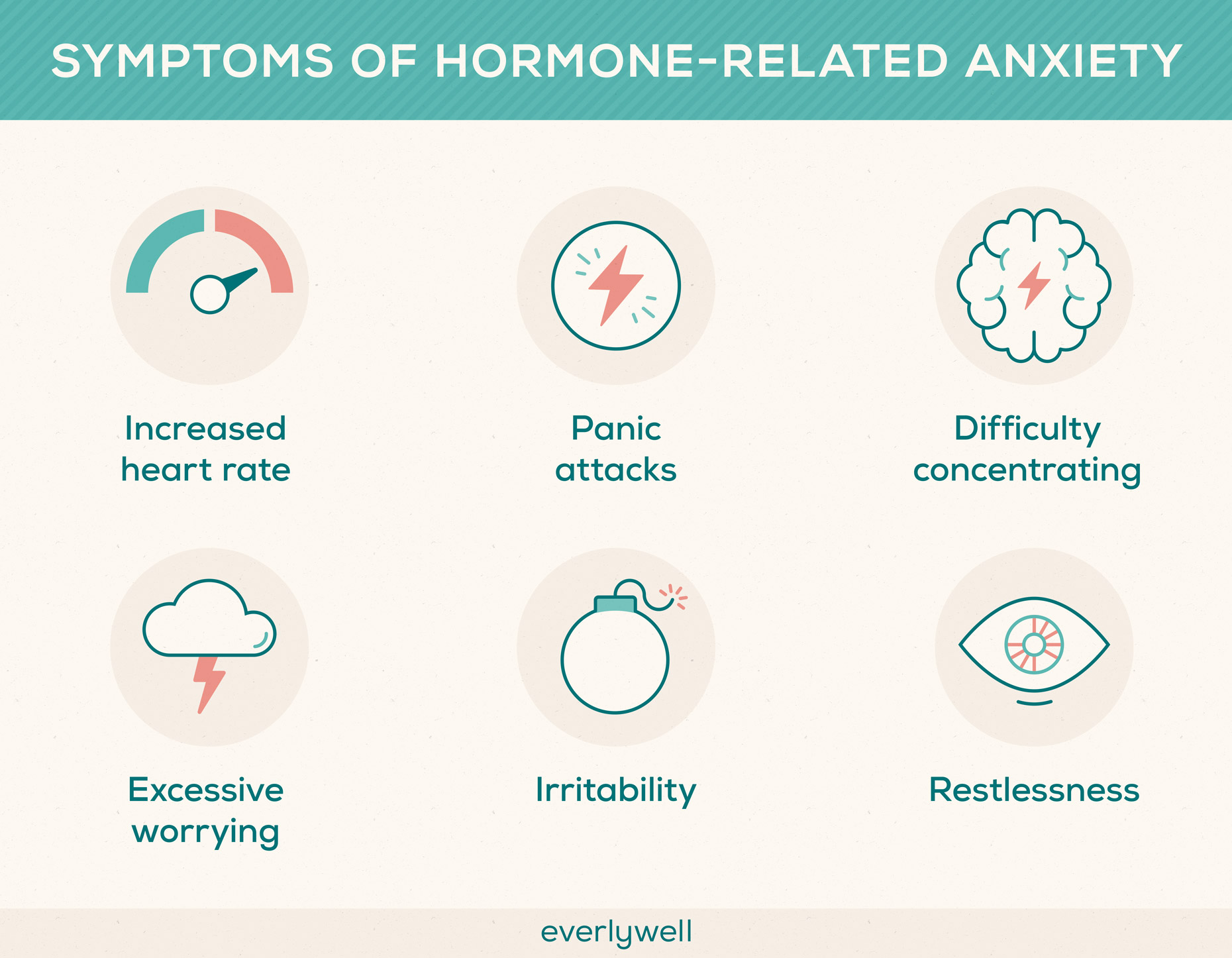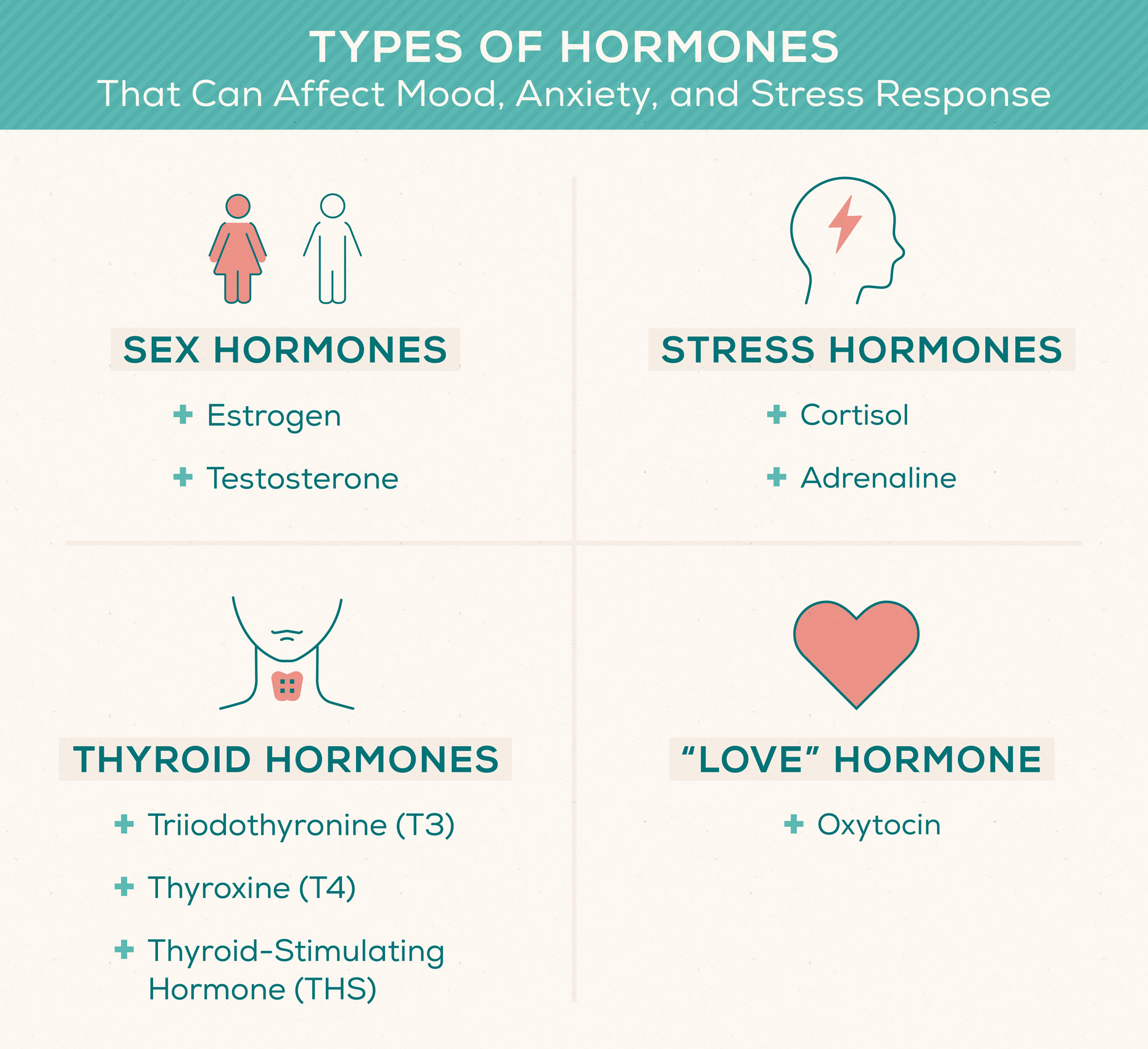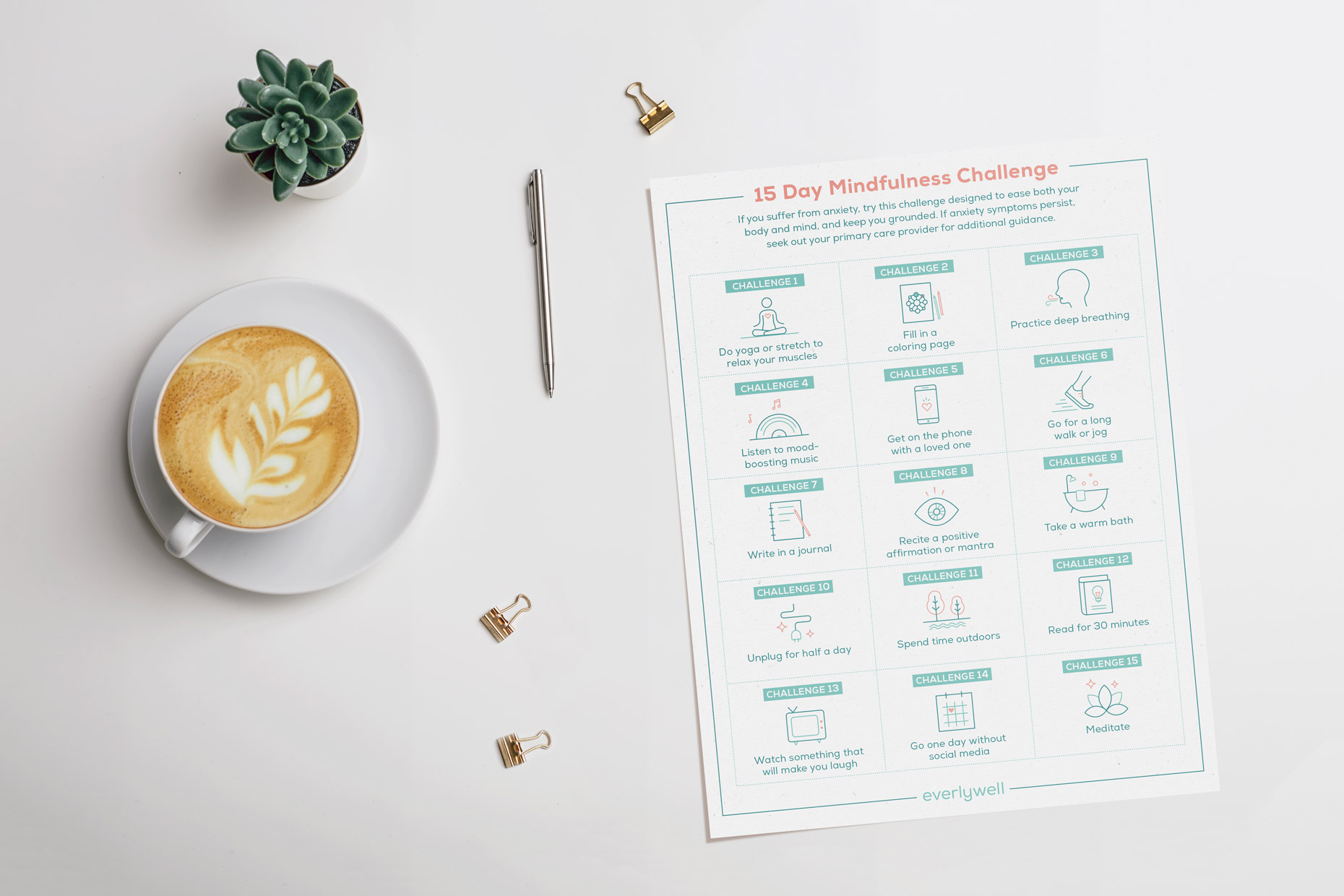Hormones and Anxiety: How They’re Related and Tips for Finding Relief
Medically reviewed on 8/15/2022 by Jordan Stachel, M.S., RDN, CPT. To give you technically accurate, evidence-based information, content published on the Everlywell blog is reviewed by credentialed professionals with expertise in medical and bioscience fields.
For many adults, anxious feelings can turn up at any moment. Excess caffeine, local and global events, or even an ex-partner can trigger anxiety. Countless factors can cause anxious feelings, so it’s not hard to believe that anxiety is also a possible symptom of certain hormone imbalances.
So, what exactly is the connection between hormones and anxiety? Hormones are chemical messengers that send signals to different parts of the body. They’re responsible for regulating various processes, like growth and development, metabolism, reproduction, sexual function, and mood. If your hormones become imbalanced (meaning your levels are too high or too low), they can interfere with the body’s normal processes—causing a variety of complications, including anxiety.
While anxiety can have multiple causes, symptoms unrelated to trauma, loss, a major life event, or a mental health condition may be attributed to a hormonal imbalance. Read on or skip to our infographic as we dive into the relationship between hormones and anxiety and provide tips to help manage anxious feelings.
Table of Contents
- Can a Hormonal Imbalance Cause Anxiety?
- Which Hormones Cause Anxiety?
- Signs of a Hormone Imbalance
- 4 Ways to Support Balanced Hormones and Reduce Anxiety
- Infographic
Can a Hormone Imbalance Cause Anxiety?
While anxiety is common in individuals with certain hormone imbalances, it can be hard to know which came first or if one contributes to the other. Both sexes can suffer from a hormonal imbalance. However, people AFAB (assigned female at birth) are more commonly affected than people AMAB (assigned male at birth), putting them at a greater risk of hormone-related anxiety.
Why? People AFAB may have a higher risk of developing anxiety disorders during different life stages where hormones fluctuate drastically, such as puberty, menstruation, pregnancy, postpartum, perimenopause, and postmenopause.

Unfortunately, hormones and anxiety can be a bit of a chicken and an egg situation. Hormonal imbalances may cause anxiety in some people and be the result of increased anxiety in others.
Which Hormones Cause Anxiety?
A good step to take towards minimizing hormone-related anxiety is understanding which hormones can affect your mood and response to stress. These include sex hormones, stress hormones, thyroid hormones, and oxytocin. While each plays a pivotal role in the functioning of the body’s processes, too much or too little could cause complications.

Estrogen
Fluctuating levels of estrogen and testosterone, which are considered sex hormones, may play a role in how much anxiety you experience. Changing levels of these hormones can affect your mood. This is why anxiety sometimes peaks during times of hormonal change such as puberty, menstruation, pregnancy, and menopause.
Estrogen affects mood. For people AFAB, estrogen levels are higher during the first two weeks of the menstrual cycle (follicular phase) and can induce higher levels of serotonin—which is your “happiness hormone.” However, during the luteal phase (last ~2 weeks of a 28-day cycle), estrogen levels dramatically drop if no pregnancy occurs.
Changes in mood or increased anxiety often accompany this fluctuation. In fact, as many as 80% of reproductive-age people AFAB experience at least one physical, mood, or anxiety symptom during this part of their period.
Testosterone
In general, people AFAB tend to experience more anxiety than people AMAB. To explain this, one hypothesis suggests that low testosterone is linked to increased anxiety.
Testosterone, often called the male hormone, also exists in people AFAB—but in concentrations about 10 times lower. Clinical evidence suggests that testosterone has positive effects on anxiety and depression in all sexes. However, the underlying mechanism of its protective effects is still poorly understood.
People who are interested in finding out more about their estrogen and testosterone levels can take an at-home testosterone test or female hormone level test kit and share the results with their healthcare provider to learn more.
Stress Hormones
The stress hormones, otherwise known as cortisol and adrenaline, are released when a person feels threatened or senses danger. These stress hormones initiate the fight-or-flight response to help cope with the threat and prepare the body to take action.
However, if an event or experience triggers your stress hormones while you're not actually in danger---like while reading a stressful work email---you won't use or release those hormones during a fight-or-flight response. This can cause excess levels of cortisol and adrenaline and can leave your body feeling anxious.
What's more, an increase in stress hormones can cause the body to release even more stress hormones in response, which can leave you feeling stressed and anxious.
Thyroid Hormones
Thyroid hormones can affect your mood, and an imbalance can impact how you feel both physically and mentally. Feelings of anxiety, restlessness, irritability, and nervousness are common symptoms of an overactive thyroid (hyperthyroidism). On the other end of the spectrum, an underactive thyroid can cause symptoms like fatigue and feelings of depression.
What's more, a recent study suggests that autoimmune inflammation of the thyroid could play a significant role in the development of anxiety disorders. The study examined 76 patients with anxiety disorder and found that 71 patients had an increase in blood flow to the thyroid gland---a sign of thyroid inflammation---linking thyroid abnormalities to their heightened anxiety.
If you're experiencing symptoms of anxiety, nervousness, or irritability, consider getting an at-home thyroid test and seeing a healthcare provider to discuss your results. They may recommend thyroid management medications or other methods to reduce or alleviate your symptoms.
Oxytocin
Some hormones---like oxytocin---have a positive impact on anxiety and may help reduce it. Oxytocin is often called the "love hormone," as the brain emits it when hugging, cuddling, having sex, and even when a mother breastfeeds.
Oxytocin modulates anxiety, aggression, and the stress/fear response when one is introduced to different types of stimuli. Anxiety and emotional responsiveness to stress may decrease during periods of high oxytocin activity in the body, such as lactation and sexual activity.
Signs of a Hormonal Imbalance
Anxiety isn't the only potential side effect of a hormone imbalance. IIf you suspect that your anxious feelings might be linked to your hormones, knowing the other possible signs of an imbalance can help you make the connection.
Potential signs of a sex hormone imbalance include:
- Irregular Periods
- Adult Acne
- Heavy periods
- Vaginal dryness
- Hair loss
- Excess body hair
- Reduced sex drive
- Erectile dysfunction
- Loss of muscle mass
Potential signs of an imbalance affecting metabolism include:
- Increased thirst
- Fatigue
- Diarrhea or Constipation
- Sensitivity to warm or cold temperatures
- Dark patches of skin on the neck or armpits
- Frequent urination
- Weight gain or weight loss
4 Ways to Support Balanced Hormones and Reduce Anxiety
Hormone imbalances can feel like an emotional rollercoaster. Fortunately, there are several natural ways to support balanced hormones to reduce feelings of hormone-related anxiety.
-
Exercise daily: Regular exercise is linked to a reduced risk of developing an anxiety disorder by lowering cortisol and adrenaline levels and releasing endorphins.
-
Find strategies to manage stress: We now know that stress can cause the production of more stress hormones, creating a vicious cycle. Relaxation techniques like meditation and yoga have been shown to help some individuals manage their stress and anxiety levels.
-
Improve your diet: Research shows that filling your diet with fiber-rich foods, fermented foods, and omega-3s can reduce levels of stress/anxiety and potentially improve mental health. If you have a condition like IBS or celiac disease, learning which foods to avoid can also help improve your mental and physical health.
-
Get enough sleep: Poor sleep has been linked to multiple hormone imbalances. If you're suffering from anxiety, take a look at your sleep routine to see where you might be able to make improvements.
If you suspect you may have a hormonal imbalance, consider testing your hormone levels. This can give you and your primary healthcare provider clarity on whether your anxiety is a symptom of a hormonal imbalance or not. Anxiety can be debilitating, so be sure to seek guidance from a mental health professional and/or call this national helpline at 1-800-662-HELP (4357).
Check out the infographic below to learn more about hormone-related anxiety and discover quick tips to support balanced hormones.
Infographic

Sources:
-
Endocrine Library. Endocrine Society. URL. Accessed July 19, 2022.
-
Gender Differences in Anxiety Disorders: Prevalence, Course of Illness, Comorbidity, and Burden of Illness. National Library of Medicine. URL. Accessed July 19, 2022.
-
Anxiety Disorders Among Women: A Female Lifespan Approach. National Library of Medicine. URL Accessed July 19, 2022.
-
Associations Between Anxiety, Body Mass Index, and Sex Hormones in Women. National Library of Medicine. URL. Accessed July 19, 2022.
-
Sex Differences in Anxiety and Depression: Role of Testosterone. National Library of Medicine. URL. Accessed July 19, 2022.
-
Understanding the Stress Response. Harvard Health Publishing. URL. Accessed July 19, 2022.
-
Thyroid Disease: Can It Affect a Person's Mood? Mayo Clinic. URL. Accessed July 19, 2022.
-
Study Finds Thyroid Inflammation Tied to Anxiety Disorders. Endocrinology Network. URL. Accessed July 19, 2022.
-
The Role of Intranasal Oxytocin in Anxiety and Depressive Disorders: A Systematic Review of Randomized Controlled Trials. National Library of Medicine. URL. Accessed July 19, 2022.
-
Hormonal Imbalance. Cleveland Clinic. URL. Accessed July 19, 2022.
-
Exercising to Relax. Harvard Health Publishing. URL. Accessed July 19, 2022.
-
Exercise for Stress and Anxiety. Anxiety and Depression Association of America. URL. Accessed July 19, 2022.
-
Nutrient and Stress Management. Journal of Nutrition and Food Sciences. URL. Accessed July 19, 2022.
-
Extent and Health Consequences of Chronis Sleep Loss and Sleep Disorders. Sleep Disorders and Sleep Deprivation: An Unmet Public Health Problem. URL. Accessed July 19, 2022.


